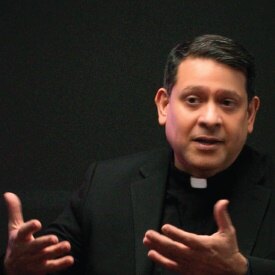Amen
Pontifical Agreement

It was fall 2022, and the Rev. Alberto Anguiano, rector of the Pontifical Universidad of Mexico, had a problem.
A graduate of Rome’s Gregorian University, Anguiano knew that aspiring priests traditionally fill the student ranks at pontifical universities such as UPM and his alma mater. Like its counterparts across the globe, however, Mexico’s only pontifical university was facing enrollment challenges in light of shrinking vocations to the priesthood worldwide.
Luckily, pontifical alumni tend to form tight cohorts: Up in Houston, a fellow pontifical Houstonian graduate, UST’s the Rev. Dempsey Rosales-Acosta, had been tasked with growing the University’s Centro Semillero, a Spanish-language, online-only graduate theology program. Anguiano reached out to reconnect and brainstorm.
“The issue in our conversation was how to make a liaison for mutual benefit,” Rosales-Acosta remembers.
Their conversations continued, and last fall yielded a groundbreaking partnership between UST and UPM that opened unprecedented opportunities for both institutions. The agreement advances two key priorities of UST’s 2030 Strategic Vision “Greater Things;” leveraging international partnerships and achieving recognition for innovation in Catholic education.
Eager for new students but hampered from expansion by the strict regulations governing the administration of pontifical degrees, UPM’s partnership with the Centro means it will now be able to offer two new certificates containing the nihil obstat of the Vatican’s Pontifical Dicastery for Education. Additional degrees, pontifical and civil, will be added to the UPM’s programming in subsequent stages of the new UST/UPM agreement.
The Centro, for its part, can now offer its graduates special access to UPM’s prestigious programming. UST students who complete a master’s degree at the Centro have permission to enroll in the UPM’s new certificate programs, and when the next phases of the agreement are complete, will eventually have access to getting either a civil or pontifical degree from the UPM as Centro graduates.
Both institutions will benefit from the resulting two-way flow of resources, curricula, students, and even faculty as each gains first-time access to a new type of academic programming. By offering civil degrees, for example, the UPM can circumvent the traditional prohibition against online instruction for pontifical degrees, while UST may eventually develop its own Pontifical B.A. in Religious Sciences.
“This new agreement is groundbreaking,” noted UST’s Associate Vice President for International Relations & Engagement Hans Stockton, “it launches the first academic collaboration between American and Mexican universities in which the academic focus is on masters degrees taught entirely in Spanish.”
Rosales-Acosta said the historic agreement, which was co-signed by Anguiano and UST President Dr. Richard Ludwick during a ceremony in Mexico City on Oct. 6, 2023, followed months of meticulous planning.
Pontifical degrees “are a completely different ballgame” from civil degrees, Acosta explained; each maintains its own academic policies, norms and titles, and creating a partnership that allows each institution to offer the other type of degree requires oversight and approval from both the Mexican Ministry of Education and the Vatican’s Dicastery of Education.
“We spent a year planning every single angle,” Rosales-Acosta said.
That sort of innovation and creativity, however, reflects precisely the sort of paradigm shift Pope Francis urged ecclesiastical universities to adopt in response to the vast challenges of today’s world in his 2018 apostolic constitution Veritatis Gaudium.
“Pontifical universities are recognizing that they have to open themselves to lay students in new ways,” Rosales-Acosta explained. “The world is changing, and we need to create new ways to innovate, otherwise we will not be able to sustain these institutions. We need to invest in education, to form this ’providential cultural laboratory’ called for in Veritatis Gaudium.”
Centro Semillero
Founded in 2019, the University’s Centro Semillero has flourished under the directorship of Fr. Dempsey Rosales-Acosta, tenured professor of Theology and Archbishop J. Michael Miller, CSB Endowed Chair in Catholic Studies.
The online-only, Spanish-language Centro offers two graduate programs, a Master’s in Pastoral Theology and a Master’s in Sacred Scriptures, and now boasts nearly 140 students.
Most of the students are laypersons, according to Rosales-Acosta, and he says enrollment is booming for multiple reasons. The Centro’s online accessibility and night classes are convenient for parents, full-time workers, and students in other countries, and of course, he added, “The language is a big deal.” However, the primary reason is a powerful sense of vocation, a desire among students “to love God, serve God and serve in the community” through their graduate work and ministry.
It’s a desire the Centro Semillero was founded to meet.
In Spanish, “Semillero” means “seedbed,” the carefully prepared soil where seeds are planted to germinate and grow, and Rosales-Acosta says the Centro was inspired by Proverbs 2:2-3. “Tune your ears to wisdom, and concentrate on understanding,” the passage reads. “Cry out for insight and ask for understanding.”
In light of the Centro’s new partnership with Mexico’s Pontifical University, that longing for wisdom is increasing, and the seedbed is expanding once again.